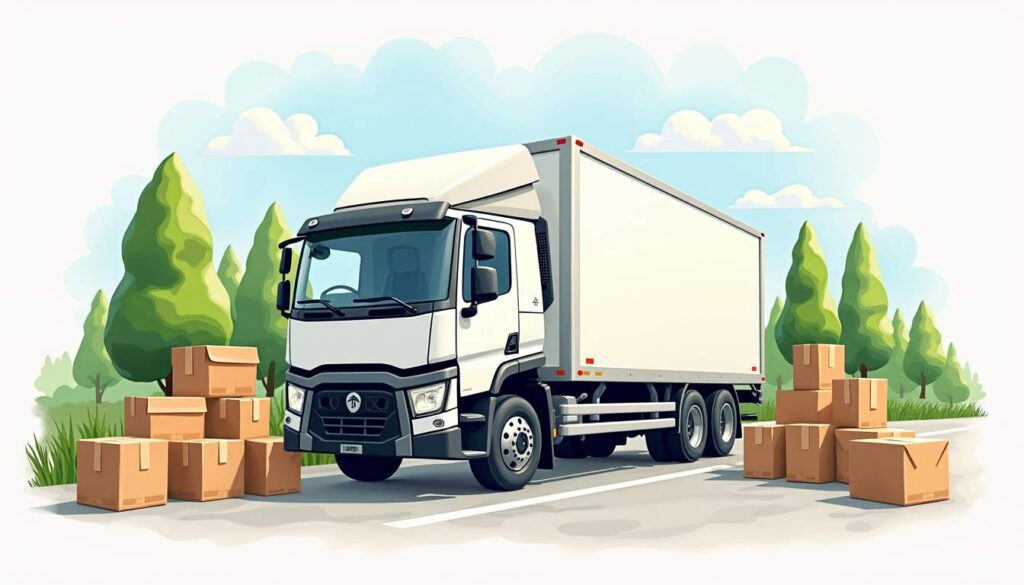As society becomes increasingly aware of environmental issues, the moving industry is undergoing a significant transformation. The rise of sustainable practices in this sector is not just a trend; it’s a necessary evolution. With electric trucks and recycled packing materials leading the charge, the way we move is becoming more eco-friendly than ever before.
The Shift Towards Sustainability in Moving
In recent years, the moving industry has faced scrutiny over its environmental impact. Traditional moving practices often involve gas-guzzling trucks and single-use packing materials, contributing to pollution and waste. However, a growing number of companies are now prioritizing sustainability, recognizing that consumers are looking for greener options.
Consumer Demand for Eco-Friendly Options
Today’s consumers are more environmentally conscious than ever. Many individuals prefer to support businesses that align with their values, particularly when it comes to sustainability. This shift in consumer behavior has prompted moving companies to rethink their operations and adopt greener practices.
From using electric vehicles to implementing recycling programs, many companies are responding to this demand. By offering eco-friendly options, moving companies can attract a customer base that prioritizes sustainability, ultimately leading to a more responsible industry. Additionally, some companies are exploring innovative packing solutions, such as biodegradable packing peanuts and reusable moving boxes, which significantly reduce waste. These alternatives not only minimize environmental impact but also resonate with customers who are eager to reduce their carbon footprint during their relocation process.
Regulatory Changes and Incentives
Governments worldwide are also playing a crucial role in promoting sustainable practices in the moving industry. Regulations aimed at reducing carbon emissions are becoming more common, encouraging companies to transition to electric vehicles. In some regions, financial incentives are available for businesses that invest in sustainable technologies, making it easier for moving companies to make the switch.
These regulatory changes not only help the environment but also create a competitive landscape where sustainable practices can thrive. As more companies adopt electric trucks and eco-friendly materials, the industry as a whole moves toward a greener future. Furthermore, local governments are increasingly collaborating with moving companies to establish eco-friendly initiatives, such as community recycling drives and educational programs that raise awareness about sustainable moving practices. These partnerships not only enhance the reputation of participating companies but also foster a sense of community responsibility, encouraging residents to think critically about their own moving habits and their impact on the environment.
The Role of Electric Trucks
Electric trucks are at the forefront of the sustainable moving movement. These vehicles offer a cleaner alternative to traditional gas-powered trucks, significantly reducing greenhouse gas emissions. As technology improves and charging infrastructure expands, electric trucks are becoming increasingly viable for long-distance moves.
Benefits of Electric Trucks
One of the primary benefits of electric trucks is their reduced environmental impact. Unlike their gas counterparts, electric vehicles produce zero tailpipe emissions, contributing to cleaner air quality. Additionally, electric trucks are often quieter, reducing noise pollution in residential areas during moves.
Moreover, electric trucks can lead to cost savings over time. Although the initial investment may be higher, the lower operating costs associated with electricity and reduced maintenance can make electric trucks a more economical choice in the long run. The simplicity of electric drivetrains means fewer moving parts, which translates to less wear and tear and lower repair costs. Furthermore, many electric trucks come equipped with advanced technology features that enhance driver safety and efficiency, such as regenerative braking systems that recover energy during deceleration, further improving their overall efficiency.
Challenges and Limitations
Despite the numerous advantages, there are challenges associated with the widespread adoption of electric trucks in the moving industry. One significant hurdle is the range of electric vehicles, which can be limited compared to traditional trucks. For long-distance moves, this can pose logistical challenges, especially in areas with limited charging infrastructure. The need for strategic planning around charging stops can complicate routes, particularly in rural or less developed regions where charging stations are sparse.
Additionally, the upfront cost of electric trucks can be a barrier for smaller moving companies. While incentives exist, not all businesses can afford to make the transition immediately. However, as technology continues to advance and more companies enter the electric vehicle market, these challenges are likely to diminish over time. The growing interest in electric trucks is also prompting investments in charging networks, with more companies and municipalities working together to create a robust infrastructure that supports electric vehicle use. This collaboration not only benefits moving companies but also contributes to a broader shift towards sustainable transportation solutions across various industries.
Recycled Packing Materials: A Greener Choice
In addition to electric trucks, the use of recycled packing materials is another key component of sustainable moving. Traditional packing supplies, such as cardboard boxes and bubble wrap, often end up in landfills after a single use. By opting for recycled materials, moving companies can significantly reduce waste and promote a circular economy.
The Benefits of Using Recycled Materials
Recycled packing materials offer several advantages for both the environment and consumers. Using materials that have already been processed reduces the need for new resources, conserving energy and minimizing environmental degradation. Furthermore, many recycled packing materials are just as sturdy and reliable as their non-recycled counterparts, ensuring that belongings are well-protected during transit.
Additionally, consumers often appreciate the transparency that comes with using recycled materials. Many moving companies now provide information about the sourcing of their packing supplies, allowing customers to make informed choices about the environmental impact of their move.
Innovative Packing Solutions
As the demand for sustainable packing materials grows, innovative solutions are emerging. Some companies are exploring biodegradable packing peanuts, reusable moving blankets, and even packing materials made from mushroom mycelium. These alternatives not only reduce waste but also offer unique benefits in terms of protection and sustainability.
Moreover, businesses are increasingly adopting a “reuse” mindset, encouraging customers to return boxes after their move for future use. This approach not only minimizes waste but also fosters a sense of community and shared responsibility.
The Future of Sustainable Moving
The future of the moving industry is undoubtedly leaning towards sustainability. With advancements in technology and a growing awareness of environmental issues, electric trucks and recycled packing materials are set to become the norm rather than the exception. As more companies embrace these practices, the industry will continue to evolve, prioritizing eco-friendliness alongside customer satisfaction.
Collaboration and Industry Standards
To further drive the adoption of sustainable practices, collaboration among industry stakeholders is essential. Moving companies, manufacturers of packing materials, and regulatory bodies must work together to establish industry standards that promote sustainability. By sharing best practices and resources, the industry can collectively move towards a greener future.
Furthermore, consumer education plays a crucial role in this transition. As customers become more informed about the environmental impact of their choices, they can advocate for sustainable options and support companies that prioritize eco-friendly practices.
Looking Ahead
As we look to the future, the integration of electric trucks and recycled packing materials into the moving industry represents a significant step towards sustainability. With ongoing advancements in technology and a commitment to reducing environmental impact, the moving industry can lead by example, demonstrating that economic viability and ecological responsibility can go hand in hand.
Ultimately, the rise of sustainable moving practices reflects a broader societal shift towards environmental consciousness. As individuals and businesses alike recognize the importance of sustainability, the movement towards greener practices in the moving industry will continue to gain momentum, paving the way for a more sustainable future.
Conclusion
The rise of electric trucks and recycled packing materials marks a pivotal moment in the moving industry. As companies adapt to meet the demands of environmentally conscious consumers, the landscape of moving is changing for the better. By embracing sustainability, the industry not only reduces its environmental footprint but also sets a precedent for other sectors to follow.
As electric trucks become more commonplace and recycled materials gain traction, the future of moving looks promising. With a collective effort from consumers, businesses, and regulatory bodies, the journey towards sustainable moving is well underway, and the benefits will be felt for generations to come.
















